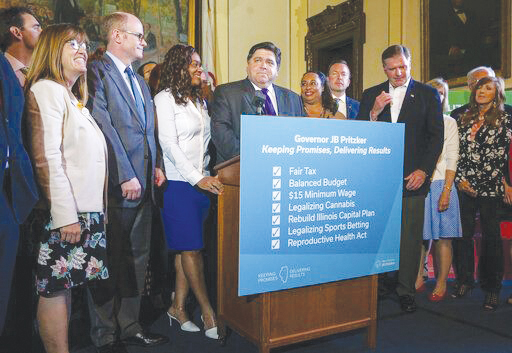By CARL GREEN
Illinois Correspondent

Springfield, IL – Labor leaders, legislators and Governor J.B. Pritzker recently celebrated what was called the state’s most productive spring session ever.
When it finally ended late on Sunday, June 2, the big decisions included:
• Raising the minimum wage.
• Asking voters to approve a progressive income tax.
• Passing a long-overdue capital bill that will put people to work throughout the state.
But the session also included passage of dozens of other bills, many of which will have direct effects on working people, including making local “right-to-work” zones illegal, legalizing marijuana, balancing the budget and improving school funding.
The Illinois AFL-CIO summarized the session this way: “Lawmakers worked past the May 31 adjournment deadline, but the session ended as one of the most productive sessions ever. Gov. Pritzker outlined his vision for the state when he began his term, and the General Assembly helped achieve those goals.”
VOTERS TO DECIDE INCOME TAX
The income tax could have the biggest impact in the long term – if at least 60 percent of voters approve it on the November 2020 ballot. It would replace the current flat tax, in which the poorest pay the same rate as the wealthiest, with a new progressive rate system, shifting much of the burden to those who can pay more.
“The income tax in Illinois is unfair, and we’ve advocated for a change to a fair tax for decades,” Illinois AFL-CIO President Michael Carrigan said. “The middle class has always carried a heavier burden. With this amendment, the scales will be more even and the wealthy will pay their fair share.”
Most people making under $250,000 would get a small tax break, and none of them would pay more. Additional new revenue would become available.
Said Pritzker: “We are on the verge of finally creating a fair income tax in Illinois that puts the burden of fixing our finances on people like me, who can most afford it, not the 97 percent of Illinoisans earning less than $250,000.”
‘NEW ERA OF FISCAL RESPONSIBILITY’
Pritzker’s budget proposal passed the Legislature largely along party lines, with just a smattering of Republican support, allotting $40.6 billion in state spending, including an additional $25 million for public schools and an extra $66 million for state universities, which were starved under the previous governor.
“This budget balances our obligations while making consequential investments for working families, for our communities and for our future,” Pritzker said. “A new era of fiscal responsibility has arrived in Illinois.”
The new budget is up by two percent, fully funding the state’s $9 billion pension obligation and includes borrowing of $1.2 billion to help pay off $6.7 billion in overdue bills.
CAPITAL IMPROVEMENTS
The Rebuild Illinois capital bill – the first one passed in 10 years – will generate $45 billion in infrastructure spending for roads, bridges, schools, state-owned buildings and more. This time, some Republicans joined Democrats in approving the plan.
As the Illinois AFL-CIO noted: “The long-needed capital plan’s passage was critical, as more than 2,300 bridges are deemed structurally deficient, and the American Society of Civil Engineers gave Illinois transportation infrastructure a D grade.”
This relief will not come without some pain. The accompanying revenue bill increases gasoline taxes by 19 cents a gallon and cigarette taxes by $1, plus higher vehicle registration costs and e-cigarette taxes.
Pritzker cited Rep. Jay Hoffman (D-Swansea) and Sen. Andy Manar (D-Bunker Hill) among the legislators whose work made the plan happen.
CANNABIS LAW MEANS UNION JOBS
Language in the marijuana bill contains several references to “Labor peace agreements” as part of the selection criteria for applicants seeking licenses for distribution centers.
Crain’s Chicago Business, hardly a Labor booster, takes that to mean the resulting industry hiring surge will include mainly union jobs. Testimony from state Rep. Emanuel Welch (D-Westchester) said the intent is “to have good, well-paying union jobs in this industry.”
The law takes effect Jan. 1 and allows residents 21 or over to have up to 30 grams of cannabis, five grams of cannabis concentrate or 500 milligrams of THC in a cannabis-infused product. Non-residents could have up to 15 grams of cannabis.
A licensed cultivation and dispensary system would be set up, medical users could grow their own, and the governor would be allowed to pardon people convicted of low-level marijuana possession in the past. The plan also calls for new state revenue of $57 million a year from the industry, although Pritzker predicts upwards of $170 million.
“I think this is the biggest piece of social justice and social equity legislation that we have passed here in the state of Illinois,” said Sen. Heather Steans (D-Chicago) in the debate.
$15 MINIMUM BY 2025
The minimum wage boost was one of the Legislature’s first acts of the session and Pritzker quickly signed it. It will give workers a $1-an-hour increase on Jan. 1, 2020 and then raise the minimum in stages to $15 by 2025.
Said Pritzker: “This session, we gave 1.4 million people a raise by putting all our minimum wage workers on a path to a $15 an hour living wage. That hard-earned raise was 10 years in the making, creating new opportunity and real hope for families across Illinois.”
He also credited Hoffman for his work on making the wage increase bill a success.
UNIONS JOIN PUSH TO EXPAND GAMING
In the last days of the session, Carrigan and other Illinois Labor leaders joined Democratic legislators at a press conference supporting a bill expanding legal gambling, which subsequently passed the Legislature. Among them was Michael Macellaio, secretary-treasurer, Chicago & Cook County Building Trades and Jake Castanza of Northwestern Illinois Building Trades.
This legislation would legalize sports gambling, allow up to six more casinos, increase the number of video gambling machines, add poker machines to O’Hare and Midway airports and permit the state’s three horse racing tracks to add casino operations and allowing two other horse tracks. Altogether, it would make Illinois by far the biggest location for gambling in the Midwest.
An increase in gaming opportunities has long been sought by supporters of Fairmount Park in Collinsville. State Rep. Katie Stuart (D-Edwardsville) has been passing a petition and filed a bill to add video gambling terminals there.
“The racetrack at Fairmount Park serves a vital role in the Metro East as entertainment, a major employer and as a community establishment,” Stuart said. “Giving places like Fairmount Park the ability to install video gaming terminals will level the playing field for tracks, while also protecting jobs that are vital to our local economy.”
PRITZKER FOR WORKING FAMILIES
In an address as the long session finally ended, Pritzker acknowledged that the state’s challenges are large and will remain.
“We started this session with an ambitious agenda. And there were skeptics. They said it couldn’t be done,” he said. “Springfield doesn’t move that quickly. Our challenges are too large and our government too dysfunctional, they said. But what the skeptics failed to realize is that no obstacle can dwarf the transformative power of a state government and legislature that stands up for working families. And with that guiding principle, together we just accomplished one of the most ambitious and consequential legislative sessions in this state’s history.
“It can be hard to gauge the power of relentless optimism until it’s reflected in the history books,” he added. “But I can say with utmost certainty that we have transformed the lives of working families all across this state. We have sent a message that Illinois’ Third Century will not be defined by its fiscal woes but by its unapologetic promise to stand on the side of its working families.”


